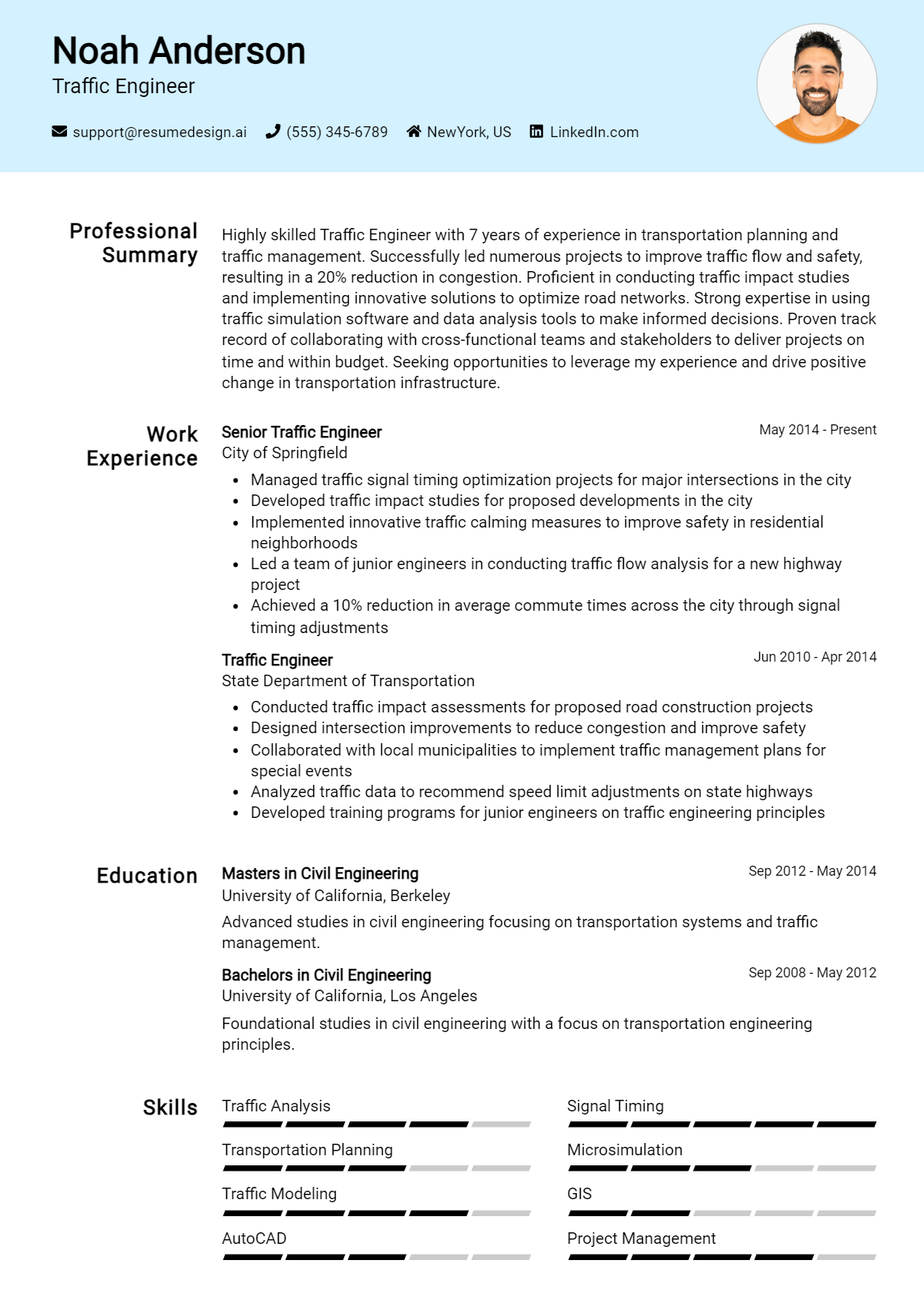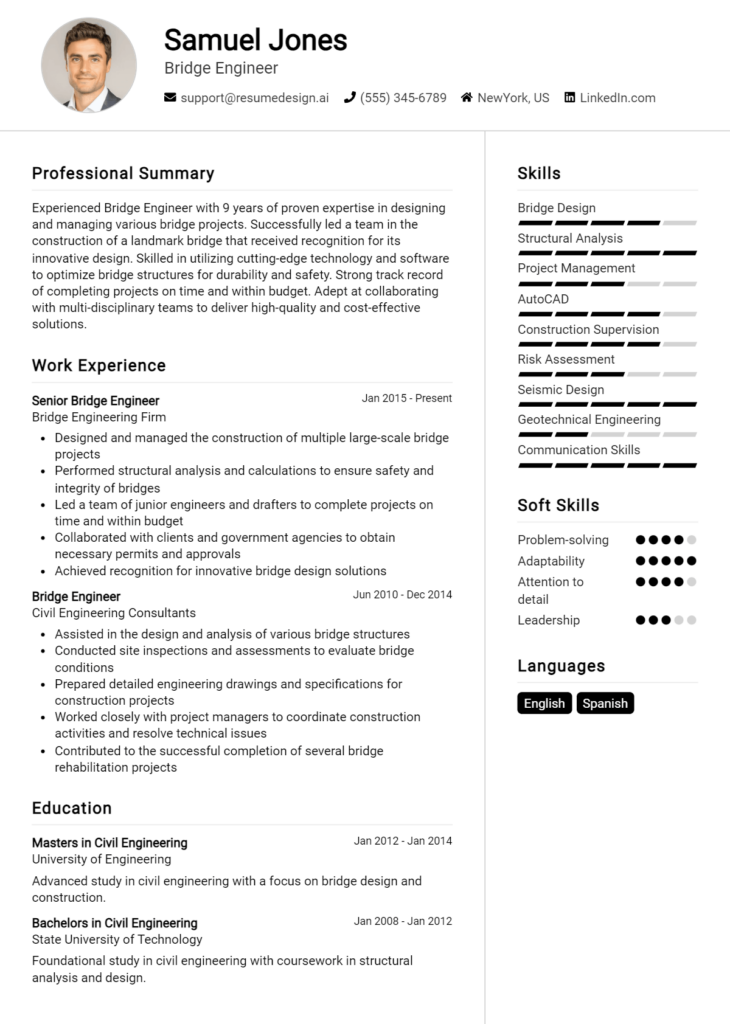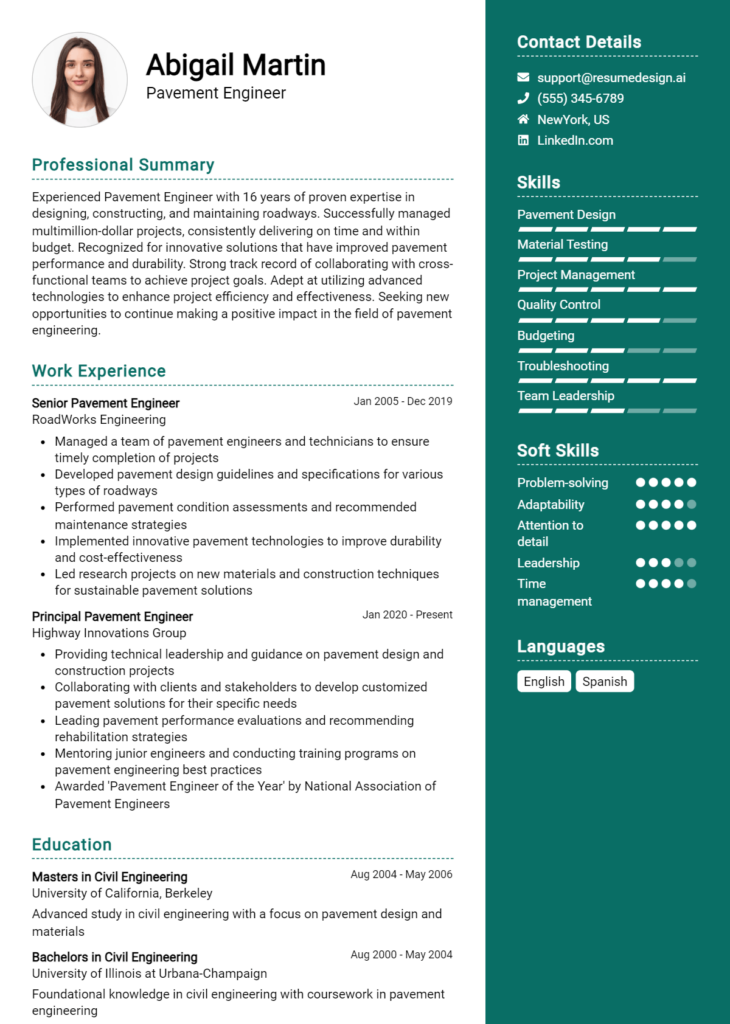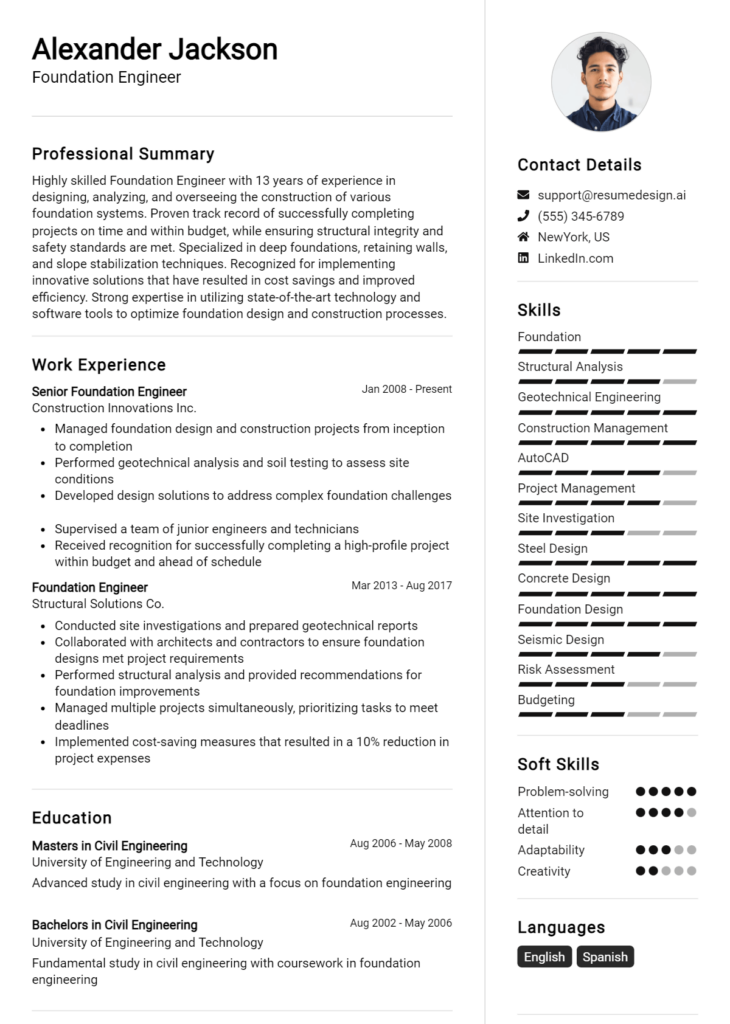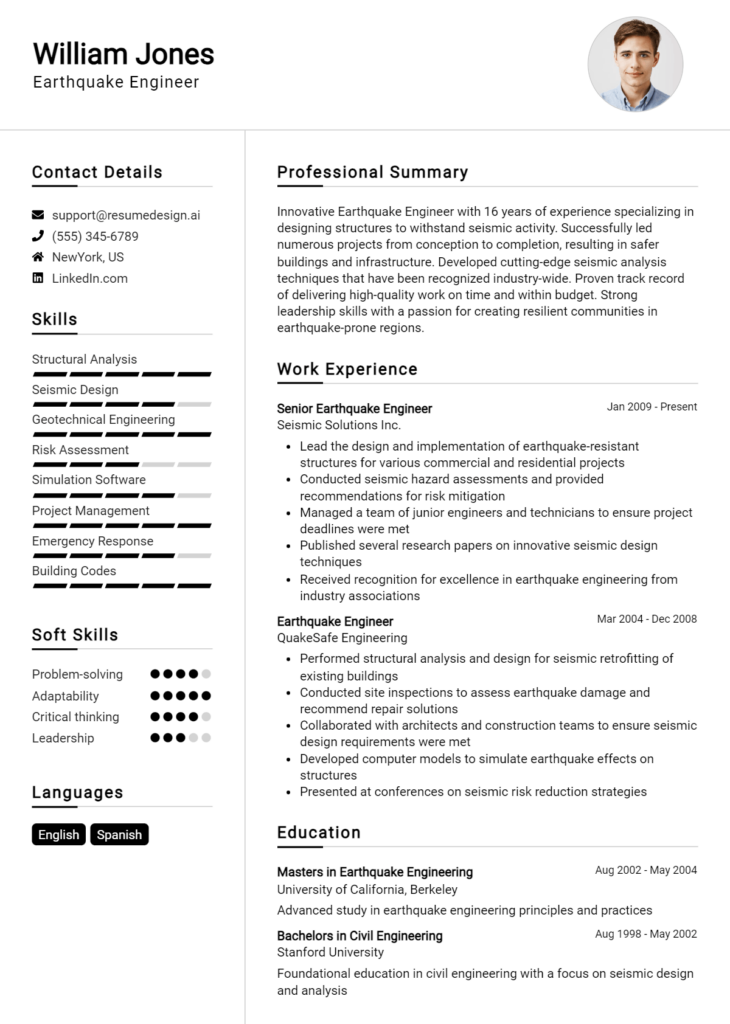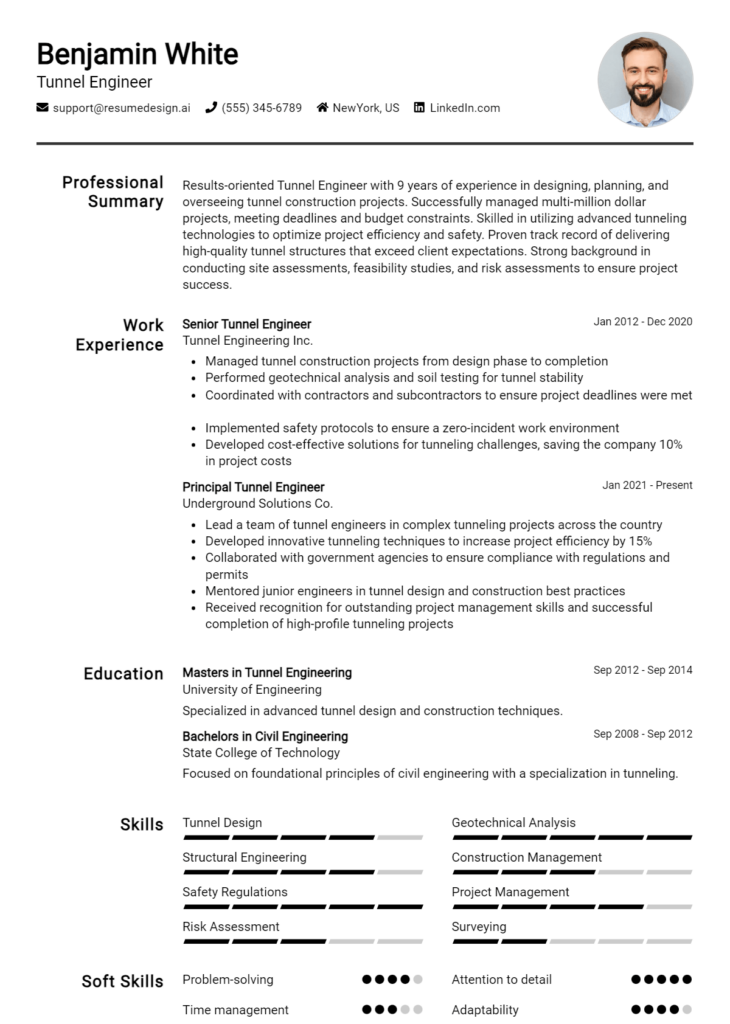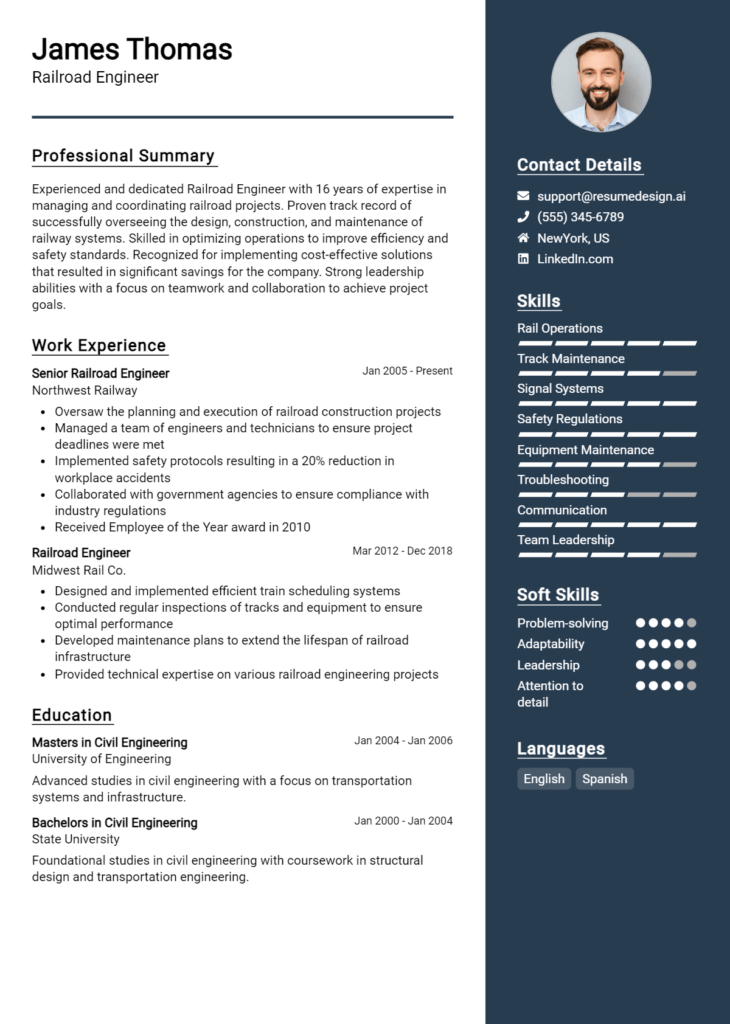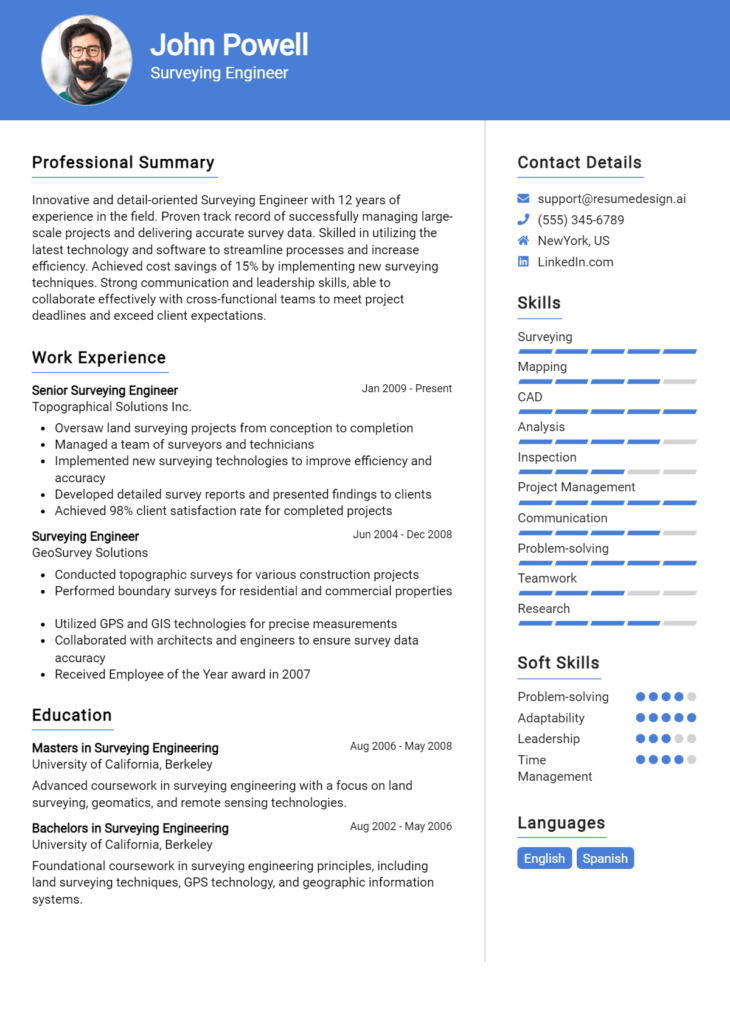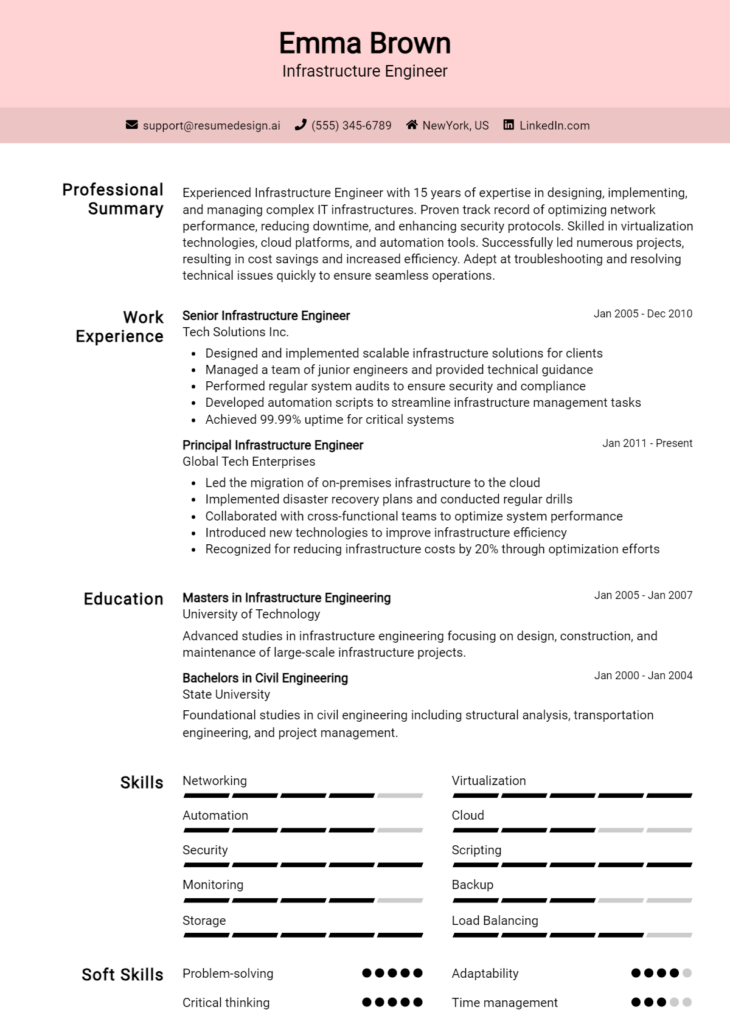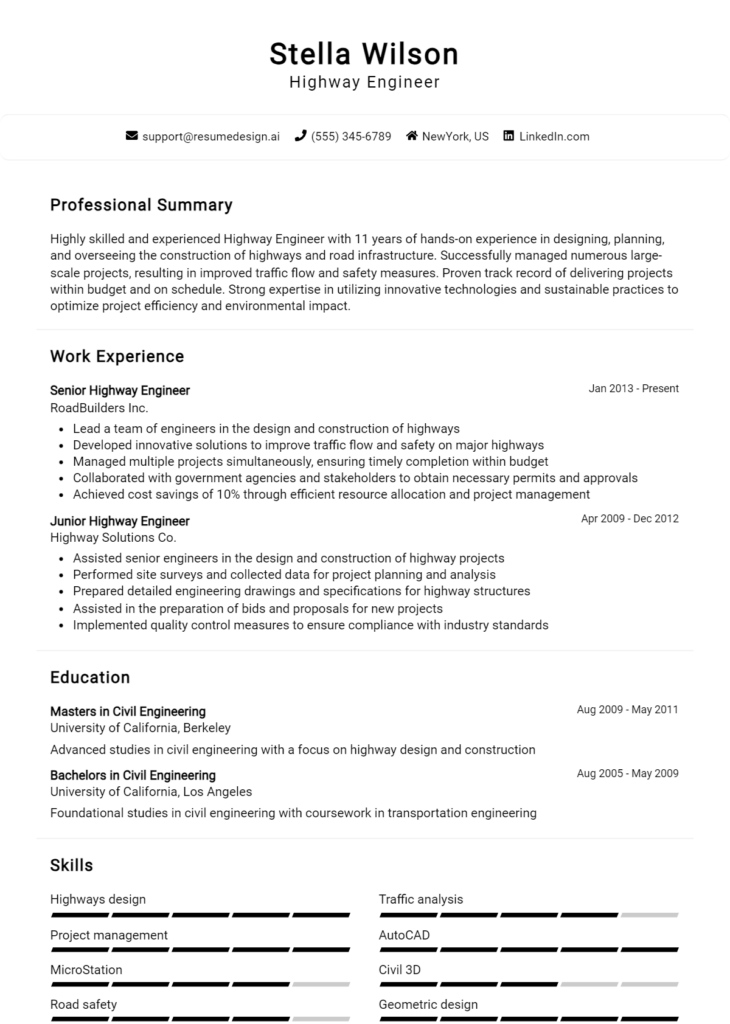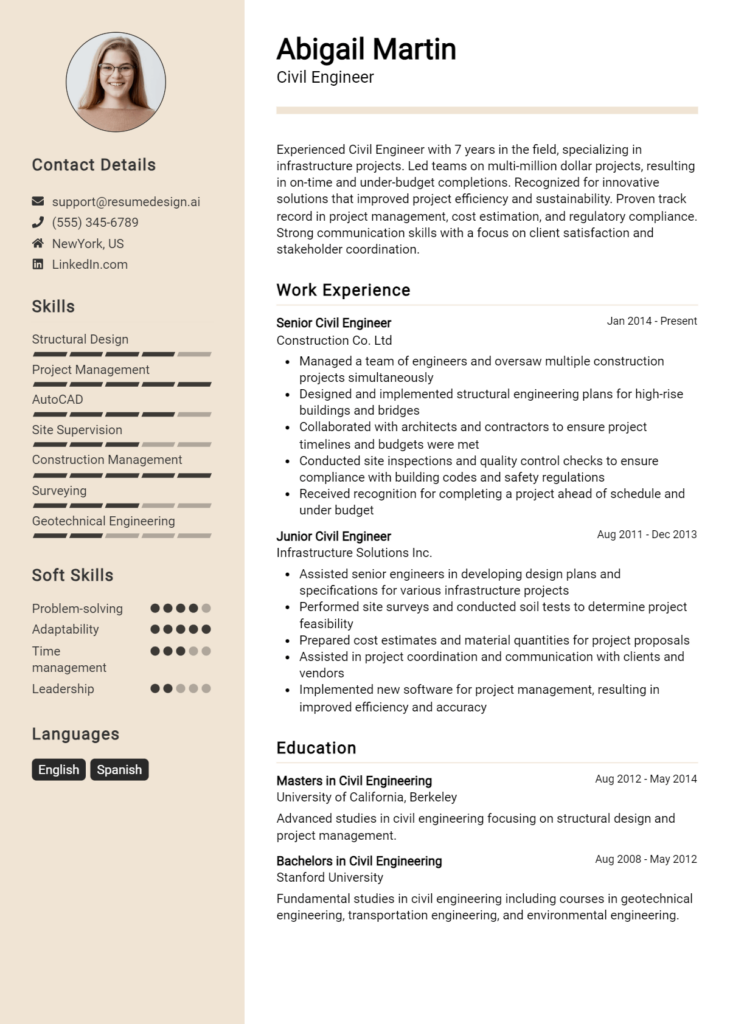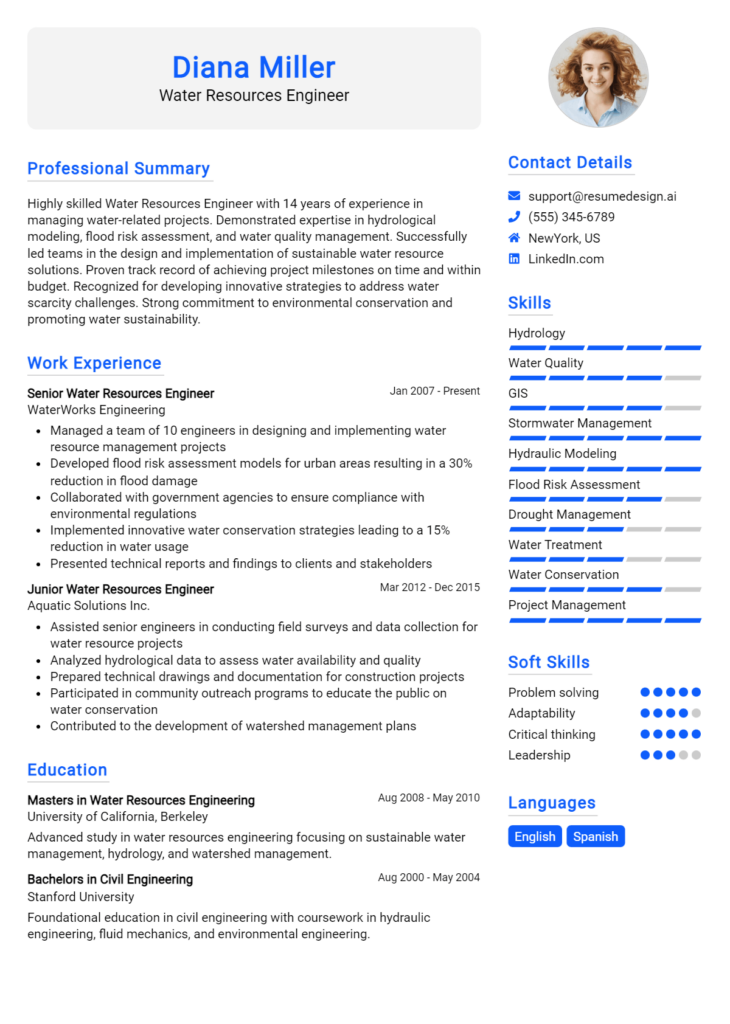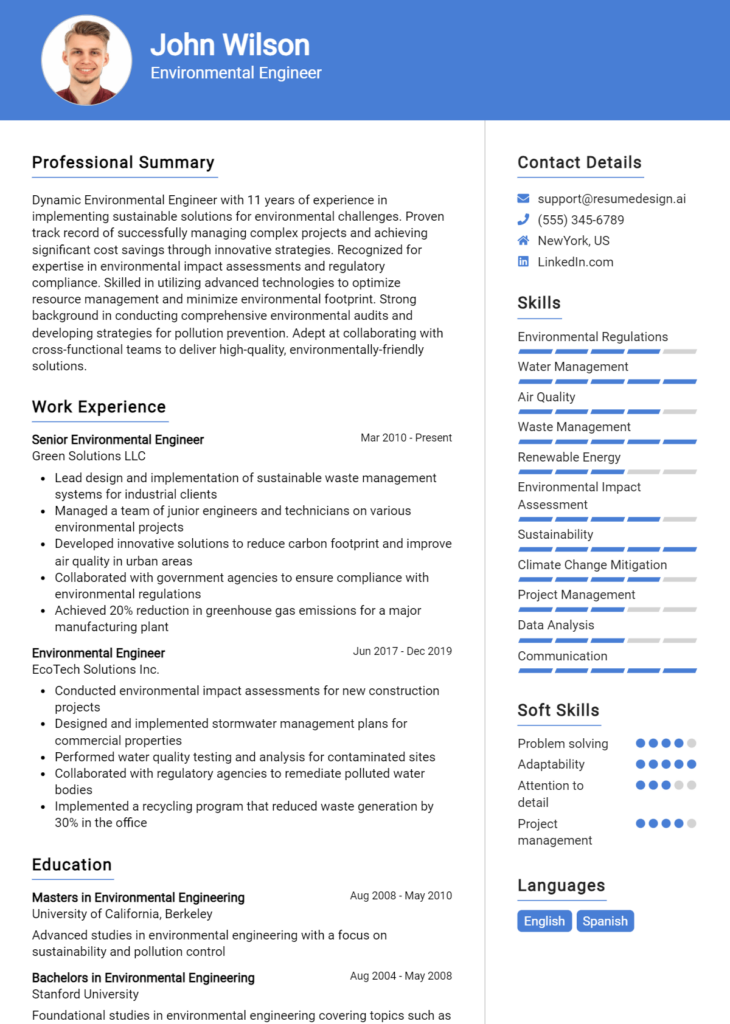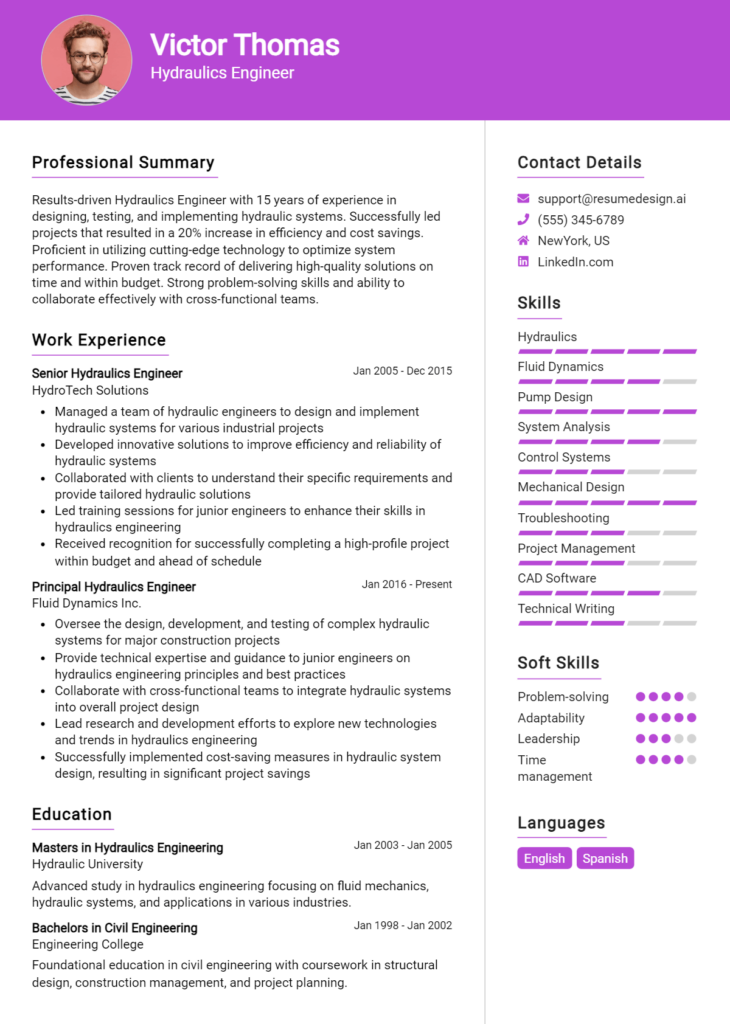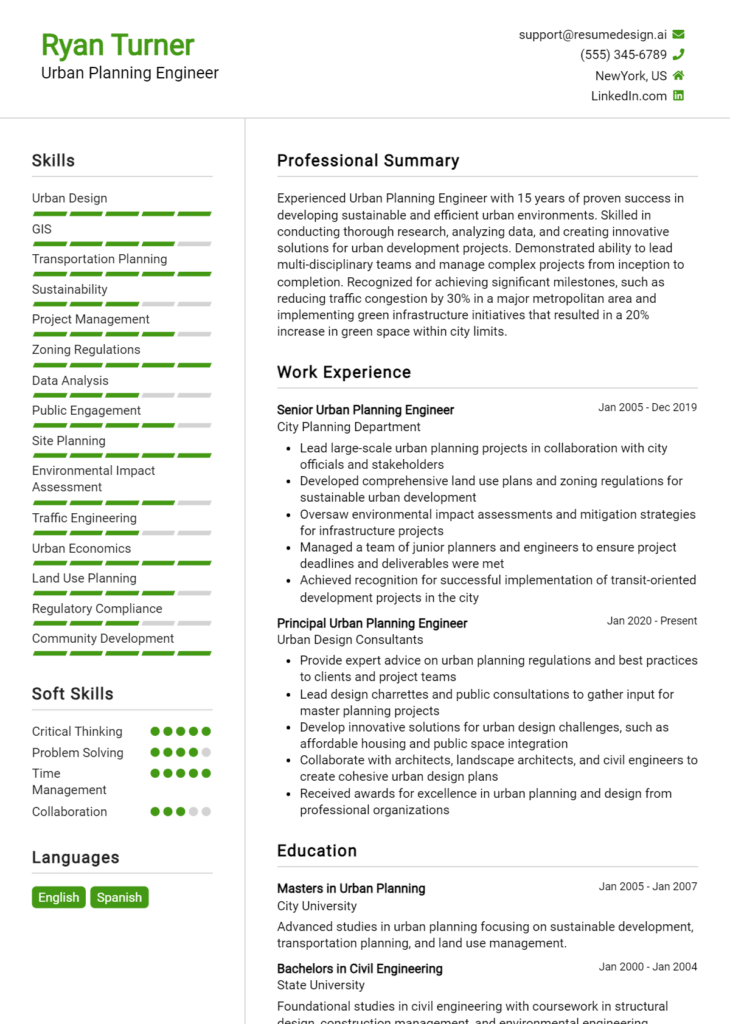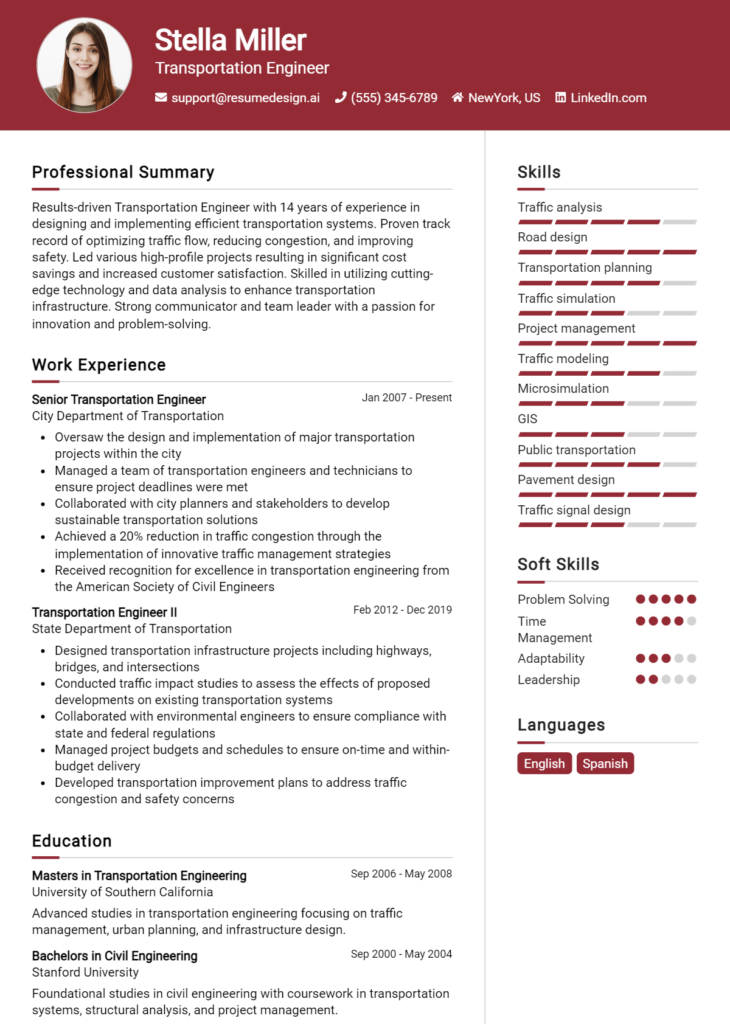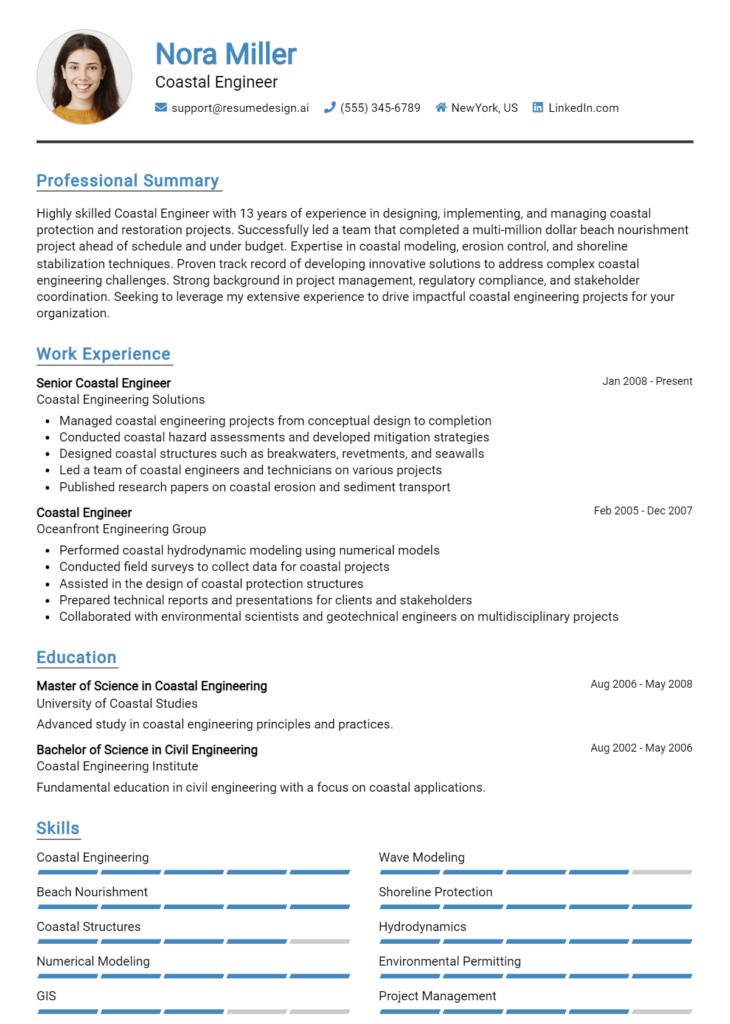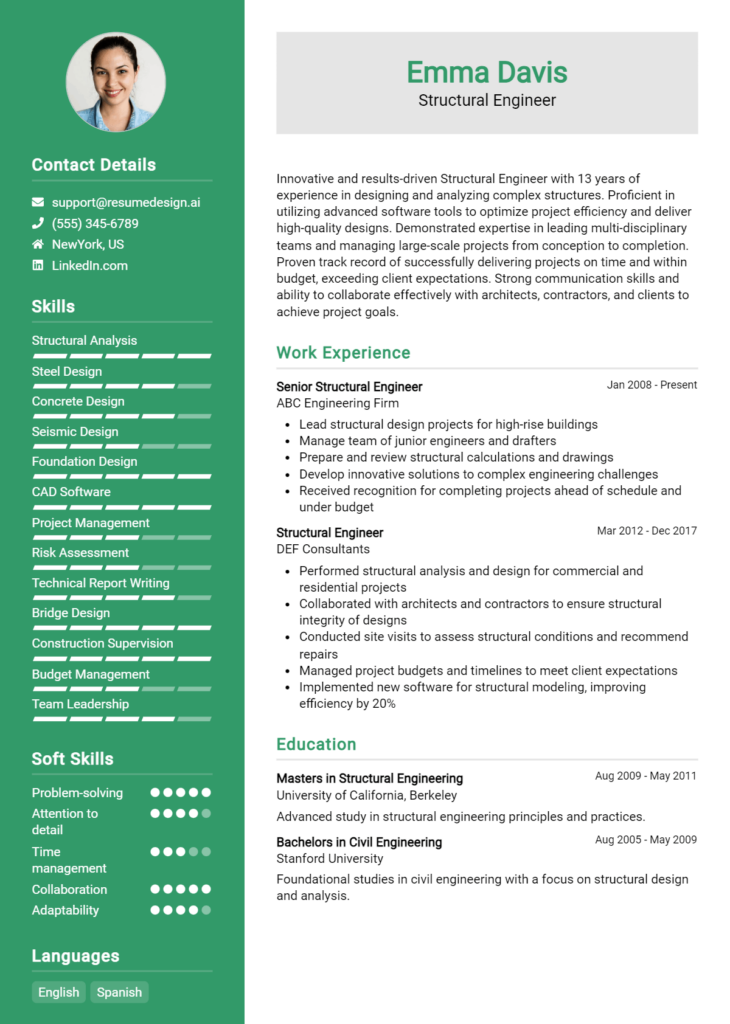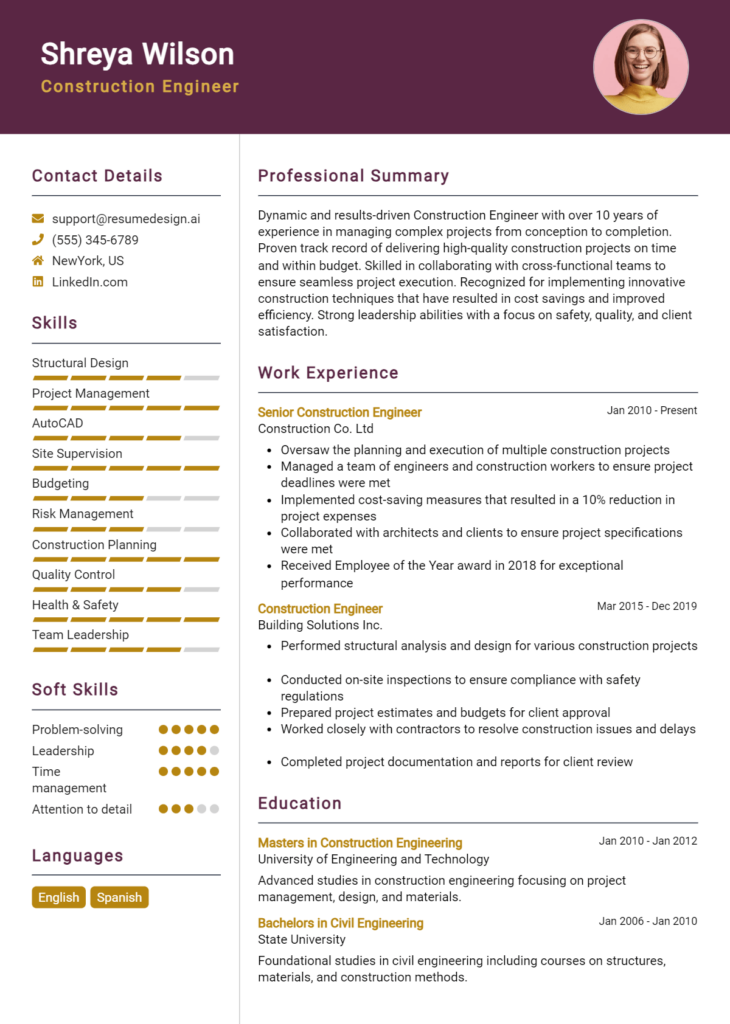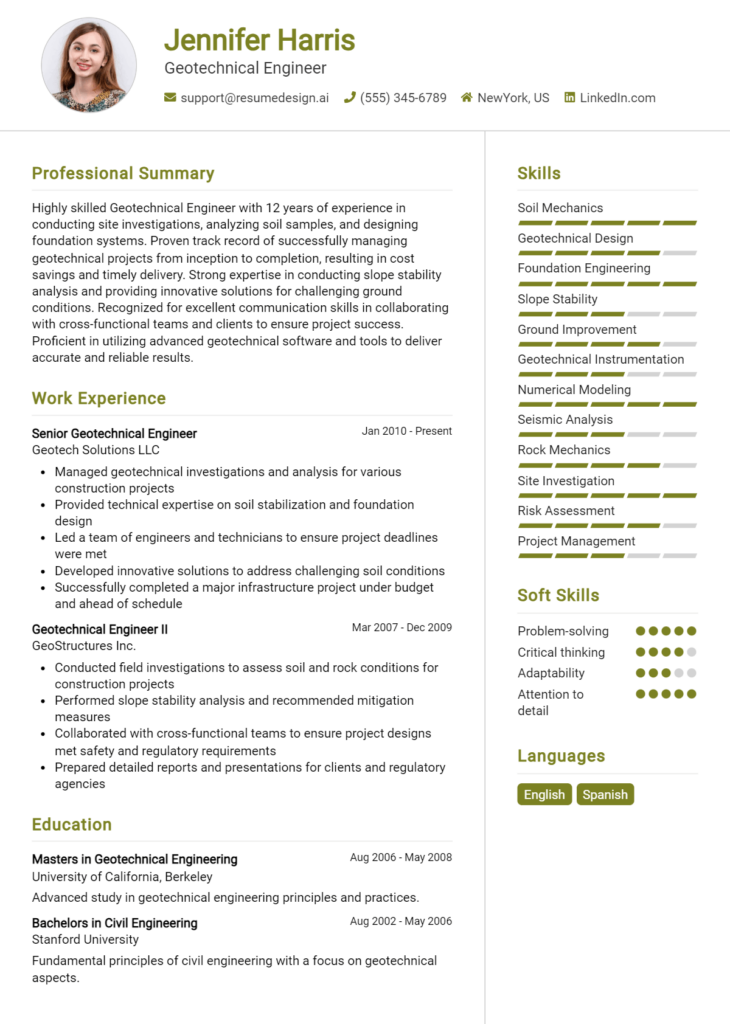Traffic Engineer Core Responsibilities
A Traffic Engineer plays a pivotal role in urban planning and transportation management, responsible for designing and optimizing road systems to ensure safe and efficient traffic flow. Core responsibilities include analyzing traffic patterns, conducting feasibility studies, and collaborating with various departments such as urban planning, public safety, and environmental agencies. Essential skills encompass technical expertise in traffic modeling, strong operational acumen, and advanced problem-solving abilities, all critical for meeting organizational goals. A well-structured resume is vital for showcasing these qualifications effectively, highlighting experience and achievements that align with industry standards.
Common Responsibilities Listed on Traffic Engineer Resume
- Conduct traffic studies and analyze data to improve transportation systems.
- Design and implement traffic control devices and road signage.
- Collaborate with city planners and public safety officials on projects.
- Evaluate and recommend improvements for road safety and efficiency.
- Prepare reports and presentations on traffic management strategies.
- Utilize traffic simulation software for modeling and forecasting.
- Manage project timelines and budgets for traffic-related initiatives.
- Ensure compliance with local, state, and federal transportation regulations.
- Monitor and assess the impact of new developments on traffic flow.
- Provide expert testimony in legal matters related to traffic incidents.
- Conduct public outreach and education on traffic safety issues.
High-Level Resume Tips for Traffic Engineer Professionals
In the competitive field of traffic engineering, a well-crafted resume is not just a formality; it is often the first impression a candidate makes on a potential employer. This document serves as a critical marketing tool that needs to effectively showcase both the skills and achievements relevant to the job. A well-structured resume can set you apart from other candidates, demonstrating your expertise in traffic systems, data analysis, and project management. In this guide, we will provide practical and actionable resume tips specifically tailored for Traffic Engineer professionals, ensuring that your resume captures the attention of hiring managers and highlights your qualifications.
Top Resume Tips for Traffic Engineer Professionals
- Tailor your resume to match the job description, using keywords from the posting to align your skills with the employer's needs.
- Highlight relevant experience in traffic modeling, roadway design, and traffic signal optimization to demonstrate your qualifications.
- Quantify your achievements by using metrics, such as reduced traffic congestion percentages or improved safety statistics, to showcase your impact.
- Emphasize industry-specific skills, such as proficiency in software tools like AutoCAD, Synchro, or VISSIM, which are essential in traffic engineering roles.
- Include certifications related to traffic engineering, such as Professional Engineer (PE) license or certifications from the Institute of Transportation Engineers (ITE).
- Utilize a clean and organized format with clear headings and bullet points to enhance readability and allow easy navigation for hiring managers.
- Incorporate relevant projects or case studies you've worked on, detailing your specific contributions and the outcomes achieved.
- Showcase soft skills that are valuable in the field, such as problem-solving abilities, communication skills, and teamwork experience.
- Keep your resume concise, ideally one page for less experienced candidates, or two pages for those with extensive experience, while ensuring all information is pertinent.
- Proofread your resume multiple times to eliminate any grammatical errors or typos, as attention to detail is critical in engineering roles.
By implementing these tips, you can significantly increase your chances of landing a job in the Traffic Engineer field. A polished and targeted resume not only showcases your qualifications but also demonstrates your commitment to professionalism and excellence, making you a more attractive candidate to potential employers.
Why Resume Headlines & Titles are Important for Traffic Engineer
In the competitive field of traffic engineering, a well-crafted resume headline or title serves as the first impression a candidate makes on hiring managers. This succinct phrase should encapsulate a candidate's core qualifications, making it imperative for it to be both engaging and relevant. A strong headline not only grabs attention but also provides a quick summary of the candidate's expertise, helping them to stand out in a sea of applicants. By being clear and focused, the headline can set the tone for the rest of the resume, effectively showcasing the candidate's fit for the role in a mere glance.
Best Practices for Crafting Resume Headlines for Traffic Engineer
- Keep it concise—aim for one impactful phrase.
- Use keywords specific to the traffic engineering field.
- Highlight unique skills or certifications relevant to the job.
- Make it action-oriented to convey a sense of achievement.
- Tailor the headline to align with the specific job description.
- Use numbers or metrics to quantify achievements when possible.
- Avoid jargon or overly technical language that may confuse.
- Ensure it reflects your most relevant experience and qualifications.
Example Resume Headlines for Traffic Engineer
Strong Resume Headlines
"Certified Traffic Engineer with 10+ Years of Experience in Urban Mobility Solutions"
“Results-Driven Transportation Planner Specializing in Sustainable Traffic Management”
“Expert in Traffic Simulation and Modeling with Proven Record of Reducing Congestion”
Weak Resume Headlines
“Traffic Engineer”
“Experienced Professional Seeking Job”
The strong headlines are effective because they are not only role-specific but also highlight key strengths and experiences that are relevant to the position. They immediately convey the candidate's value and expertise, making a compelling case for their candidacy. In contrast, the weak headlines lack specificity and do not provide any insight into the candidate's qualifications or achievements, making them forgettable and less impactful. By avoiding generic titles, candidates can enhance their visibility and appeal to hiring managers.
Writing an Exceptional Traffic Engineer Resume Summary
A well-crafted resume summary is essential for a Traffic Engineer, as it serves as the first impression for hiring managers. This brief introduction encapsulates the candidate's key skills, relevant experience, and notable accomplishments, quickly capturing attention in a competitive job market. A strong summary is concise and impactful, tailored specifically to the job being applied for, ensuring that the most pertinent qualifications are highlighted right from the start.
Best Practices for Writing a Traffic Engineer Resume Summary
- Quantify achievements: Use numbers to demonstrate the impact of your work, such as reduced traffic delays or improved safety statistics.
- Focus on skills: Highlight technical skills relevant to traffic engineering, such as proficiency in traffic modeling software or knowledge of transportation planning.
- Tailor for the job description: Customize the summary to align with the specific requirements and responsibilities mentioned in the job listing.
- Keep it concise: Aim for 2-4 sentences that clearly convey your qualifications without unnecessary fluff.
- Use action verbs: Start sentences with strong action verbs to convey confidence and proactivity.
- Showcase relevant experience: Emphasize past roles or projects that directly relate to the traffic engineering position.
- Incorporate industry keywords: Utilize language from the job description to ensure your summary resonates with both hiring managers and applicant tracking systems.
- Highlight problem-solving abilities: Mention specific challenges you've addressed in previous roles, showcasing your capability to enhance traffic systems.
Example Traffic Engineer Resume Summaries
Strong Resume Summaries
Results-driven Traffic Engineer with over 7 years of experience in urban traffic optimization, successfully reducing traffic congestion by 30% in metropolitan areas through innovative signal timing and roadway design strategies.
Dedicated Traffic Engineer with expertise in traffic modeling software, having led a team that decreased accident rates by 25% through comprehensive intersection redesigns and safety audits over the last 5 years.
Detail-oriented Traffic Engineer skilled in data analysis and project management, recognized for delivering a $1 million roadway project under budget and 3 months ahead of schedule, enhancing regional traffic flow and safety.
Dynamic Traffic Engineer with a strong background in sustainable transport solutions, contributing to a 40% increase in pedestrian safety through the implementation of advanced crosswalk technologies and community engagement initiatives.
Weak Resume Summaries
Traffic Engineer with various experience in transportation projects looking for new opportunities to improve traffic flow.
Qualified Traffic Engineer seeking to apply skills and knowledge in a challenging position within a reputable organization.
The strong resume summaries are considered effective because they contain specific, quantifiable achievements that demonstrate the candidate's impact in previous roles, along with relevant skills tailored to the job description. In contrast, the weak summaries are vague and lack detail, making it difficult for hiring managers to discern the candidates' qualifications or the value they could bring to the organization.
Work Experience Section for Traffic Engineer Resume
The work experience section of a Traffic Engineer resume plays a crucial role in demonstrating the candidate's technical proficiency and ability to manage complex projects. This section highlights the individual’s practical knowledge and experience in traffic systems, data analysis, and project execution, showcasing their capability to lead teams effectively and deliver high-quality outcomes. By quantifying achievements and aligning experiences with industry standards, candidates can present a compelling narrative of their professional journey, making it easier for employers to assess their suitability for the role.
Best Practices for Traffic Engineer Work Experience
- Highlight specific technical skills relevant to traffic engineering, such as traffic modeling software proficiency and data analysis techniques.
- Quantify achievements, using metrics to illustrate the impact of your work (e.g., reduced traffic congestion by X%).
- Use action verbs to begin bullet points, emphasizing proactive roles in projects (e.g., "Designed," "Led," "Implemented").
- Focus on collaboration experiences that illustrate your ability to work with multidisciplinary teams.
- Align your experiences with industry standards and best practices to demonstrate your knowledge of current trends.
- Include relevant certifications or training that bolster your qualifications in the field.
- Tailor your experience to the specific job you are applying for, emphasizing the most relevant projects.
- Maintain a clear, concise format that makes it easy for hiring managers to scan your achievements quickly.
Example Work Experiences for Traffic Engineer
Strong Experiences
- Led a team of engineers in the redesign of a major intersection, resulting in a 30% decrease in traffic delays and a 15% reduction in accident rates.
- Implemented a new traffic signal optimization program that improved traffic flow efficiency by 25%, serving over 10,000 vehicles daily.
- Conducted a comprehensive traffic impact study for a new commercial development, successfully securing project approval by presenting data-driven recommendations to stakeholders.
- Collaborated with city planners and environmental engineers to develop sustainable transportation solutions, reducing average commute times by 20% in the targeted area.
Weak Experiences
- Worked on traffic projects as part of a team.
- Assisted in the study of traffic patterns.
- Helped implement traffic signals.
- Participated in meetings about transportation issues.
The examples categorized as strong experiences stand out due to their specificity, quantifiable achievements, and clear demonstration of leadership and collaboration. They provide concrete evidence of the candidate's impact in their roles, showcasing how their contributions led to measurable improvements. In contrast, the weak experiences lack detail and fail to communicate the candidate's individual contributions or the significance of their roles, making it difficult for potential employers to understand their qualifications or the value they brought to previous positions.
Education and Certifications Section for Traffic Engineer Resume
The Education and Certifications section of a Traffic Engineer resume is crucial as it serves as a testament to the candidate's academic foundation and professional development in the field. This section not only showcases the educational qualifications acquired but also emphasizes industry-relevant certifications and ongoing learning efforts that keep the candidate updated with the latest practices and technologies in traffic engineering. By detailing relevant coursework, certifications, and specialized training, candidates can significantly enhance their credibility and demonstrate a strong alignment with the job role requirements, making them more appealing to potential employers.
Best Practices for Traffic Engineer Education and Certifications
- Prioritize relevant degrees, such as a Bachelor's or Master's in Civil Engineering or Transportation Engineering.
- Include industry-recognized certifications, such as Professional Engineer (PE) or Transportation Professional Certification Board (TPCB) credentials.
- Detail specific coursework that directly relates to traffic engineering, such as Traffic Flow Theory or Transportation Planning.
- Showcase any continuing education courses or workshops that pertain to evolving technologies in traffic management.
- Maintain clarity and conciseness; avoid lengthy descriptions and focus on key qualifications.
- List certifications in a separate subsection to draw attention to them effectively.
- Use a consistent format for dates and institutions to enhance readability.
- Highlight any leadership roles or special projects during educational experiences that relate to traffic engineering.
Example Education and Certifications for Traffic Engineer
Strong Examples
- Bachelor of Science in Civil Engineering, University of Transportation, 2018
- Professional Engineer (PE) License, State of XYZ, 2020
- Certificate in Transportation Safety Management, National Institute of Transportation, 2021
- Relevant Coursework: Traffic Flow Theory, Highway Design, and Transportation Planning
Weak Examples
- Bachelor of Arts in History, University of XYZ, 2015
- Certification in Basic First Aid, Red Cross, 2019
- Attended a seminar on General Project Management, 2020
- Relevant Coursework: Introduction to Sociology, Communication Skills
The strong examples are considered effective because they directly relate to the essential skills and knowledge required in traffic engineering, showcasing relevant degrees, recognized certifications, and specific coursework. On the other hand, the weak examples highlight educational qualifications and certifications that lack relevance to the field, demonstrating a disconnect from the required competencies for a Traffic Engineer position. This contrast underscores the importance of relevance and specificity in the Education and Certifications section of a resume.
Top Skills & Keywords for Traffic Engineer Resume
As a Traffic Engineer, possessing the right set of skills is crucial for effectively managing and improving transportation systems. A well-crafted resume that highlights both hard and soft skills can make a significant difference in capturing the attention of potential employers. Skills not only reflect your technical abilities but also demonstrate your capacity for teamwork, problem-solving, and communication. These attributes are essential in a field where collaboration with other professionals and stakeholders is key to developing efficient traffic solutions. By showcasing your skills effectively, you can present yourself as a well-rounded candidate ready to tackle the challenges of modern traffic engineering.
Top Hard & Soft Skills for Traffic Engineer
Soft Skills
- Communication Skills
- Problem-Solving Abilities
- Team Collaboration
- Attention to Detail
- Adaptability
- Critical Thinking
- Time Management
- Project Management
- Conflict Resolution
- Analytical Mindset
Hard Skills
- Traffic Modeling Software Proficiency
- Knowledge of Traffic Engineering Principles
- Data Analysis and Interpretation
- Geographic Information Systems (GIS)
- Road Safety Assessment
- Traffic Signal Design
- Transportation Planning
- Civil Engineering Basics
- AutoCAD and Other Design Tools
- Familiarity with Local and Federal Regulations
By emphasizing these skills in your resume, alongside your relevant work experience, you can effectively position yourself as a qualified candidate in the field of traffic engineering.
Stand Out with a Winning Traffic Engineer Cover Letter
Dear [Hiring Manager's Name],
I am writing to express my interest in the Traffic Engineer position at [Company Name] as advertised on [where you found the job listing]. With a Bachelor’s degree in Civil Engineering and over five years of experience specializing in traffic systems and transportation planning, I am eager to bring my expertise in traffic flow analysis and innovative problem-solving to your team. My background includes working on various projects that have significantly enhanced roadway safety and efficiency, making me a strong candidate for this role.
In my previous position at [Previous Company Name], I successfully led a project that involved the redesign of a major intersection, which resulted in a 30% reduction in congestion and improved safety for pedestrians and cyclists. I utilized advanced traffic modeling software to analyze data, predict traffic patterns, and develop solutions tailored to the unique needs of the community. My ability to collaborate with multidisciplinary teams, including urban planners and local government officials, has allowed me to effectively advocate for sustainable traffic solutions that align with both community values and regulatory standards.
I am particularly drawn to the opportunity at [Company Name] because of your commitment to innovative transportation solutions and community-focused projects. I am excited about the possibility of contributing my skills in traffic signal optimization, roadway design, and public outreach to help [Company Name] achieve its goals. I am confident that my proactive approach and dedication to continuous improvement will make a positive impact on your projects and the communities you serve.
Thank you for considering my application. I look forward to the opportunity to discuss how my experience and vision align with the needs of your team at [Company Name]. I am eager to contribute to the continued success of your projects and help shape a future of more efficient and safer transportation systems.
Sincerely,
[Your Name]
[Your Phone Number]
[Your Email Address]
Common Mistakes to Avoid in a Traffic Engineer Resume
When crafting a resume for a Traffic Engineer position, it’s essential to present your qualifications and experience clearly and effectively. However, many candidates make common mistakes that can undermine their chances of landing an interview. Understanding these pitfalls can help you create a compelling resume that showcases your skills and expertise in traffic engineering. Here are some frequent mistakes to avoid:
Vague Job Descriptions: Failing to provide specific details about your roles and responsibilities can make it hard for employers to gauge your experience. Use quantifiable achievements to highlight your impact.
Ignoring Keywords: Many companies use applicant tracking systems (ATS) that screen resumes for specific keywords. Not including relevant terms from the job description may lead to your resume being overlooked.
Lack of Relevant Certifications: Traffic engineering often requires specialized knowledge. Omitting certifications like Professional Engineer (PE) or Traffic Management certifications can diminish your credibility.
Poor Formatting: A cluttered or overly complex layout can distract from your qualifications. Use a clean, professional format with clear headings and bullet points for easy readability.
Overly Lengthy Resume: While it’s important to provide adequate information, a resume that exceeds two pages may lose the reader's attention. Aim for brevity while ensuring all critical information is included.
Not Tailoring the Resume: Sending the same resume for different jobs can be a missed opportunity. Customize your resume to align with the specific requirements and responsibilities of each position you're applying for.
Neglecting Soft Skills: Traffic engineers must work with various stakeholders and communicate effectively. Failing to mention relevant soft skills like teamwork, problem-solving, and communication can be a disadvantage.
Grammatical Errors and Typos: Errors in spelling, grammar, or punctuation can create a negative impression. Always proofread your resume carefully or have someone else review it before submission.
Conclusion
As we have explored the essential roles and responsibilities of a Traffic Engineer, it's clear that this profession demands a strong blend of technical knowledge, analytical skills, and effective communication. Traffic Engineers play a vital role in designing, implementing, and managing transportation systems that ensure safety and efficiency on our roads. Key aspects covered include traffic flow analysis, the importance of data-driven decision-making, and the necessity for collaboration with urban planners and local authorities.
As you reflect on your qualifications and experiences in the field, it's crucial to ensure that your resume accurately showcases your skills and achievements. A well-crafted resume can make a significant difference in your job search, setting you apart from other candidates in a competitive market.
To help you enhance your Traffic Engineer resume, consider utilizing the following resources:
- Resume Templates to find a design that fits your style and profession.
- Resume Builder for a straightforward way to create a polished and professional resume.
- Resume Examples to gain inspiration from successful Traffic Engineer resumes.
- Cover Letter Templates to complement your application and make a great first impression.
Take action today! Review your Traffic Engineer resume and leverage these tools to ensure it reflects your expertise and readiness to excel in your career.

